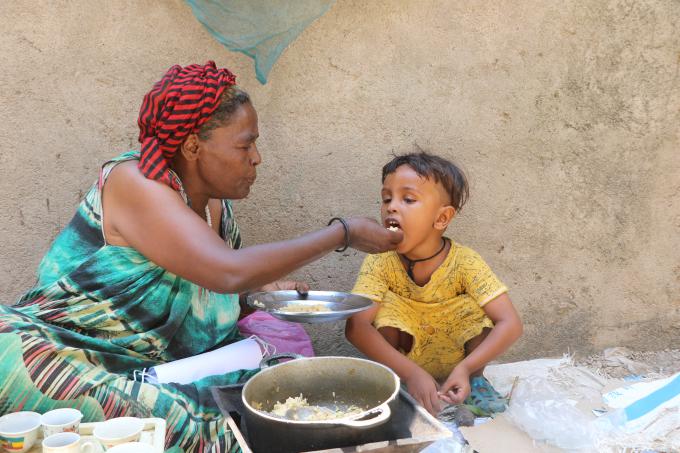Crossing over troubled waters; Mariem's story

Meriem’s story in her own words (quotes):
“I don’t do any work right now. It is with the support of my granddaughter that I am living with my son and my grand grandson here in Diredwa. Long time ago in the past, I ran a small business and used to earn good income and able to support my family. However, due to my current health problem, I could not do any job, any work as much as used to. I'm unable to support my family.
We as a community in this area including myself. we live in extreme poverty. We usually live a hand to mouth kind of life. Most of the local community here, we borrowed took food loans and other necessities from the nearby small shop and we were able to feed our children. The owner of the shop, Wolde is a very blessed man. He has a good understanding of the current situation of the local community here. So that is why, he helped many of us survive by allowing us to borrow food and other necessities on credit.
I Usually give my children Enjera with Shiro (flat bread made from thin grain flour and pea powder sauce). Sometime I give them potato and tomato, but these days, eating meat is a luxury for us. For my grandson Eyob, I sometimes prepare and feed him food such as egg and rice. My grand grandson Eyob especially likes biscuits and fruit juice, but I cannot give him that provide him because I could not afford it.
These days, food price, in particular, have risen dramatically. For example, the price of Teff (Ethiopia’s staple food from which Enjera is made), onion, tomato and cooking oil has significantly increased making it difficult for us to buy it. Especially since the onset the of Corona virus, food price have risen sharply. I am worried that if the price for food continues to rise we may not be able to provide our children with enough to eat and eventually they could starve.
My fourteen years old son Obsa, has a talent for sport in general and he has a special love for football. I think he could be one of the best professional players in the future.
Recently, Save the Children provided me with a total of two thousand birr grant. With the money I received, I was able to buy enough food for my children and the small remaining money; I used it to repair my house that had recently been destroyed by the recenta floods.
The government has announced that schools will be reopened soon. My son Obsa will return to school for the first time in eight months. When he heard the news that education was about to begin, Obsa become happier than anyone else. very happy
"I am very grateful to those who provided us with this support. When I receive the second round funding soon, I will use it to buy school supplies and uniform for Obsa. I will also use the money to buy some school material and uniform for my grand grandson Eyob who will also start school this year. "
What Save the Children doing to help Meriem and others like her?
Save the Children, through the Emergency Food Assistance for Households affected by the COVID-19 Pandemic in Major Cities in Ethiopia project provides cash support to families whose livelihoods are impacted by the pandemic for the coming six months. This support will enable households to purchase and provide enough food to their families.
The project is funded by USAID with a total budget of nine million USD for six months. The project aims to increase household access and consumption of diverse nutritious food. The project will be implemented in six major cities in Ethiopia namely, Addis Abeba, Adama, Dire Dawa, Jigjiga, Hawassa and Bahirdar reaching 29,035 households (approximately 174,210 people). So far, the project reached 5,781 households of the total 6,151 target beneficiaries.
 Ethiopia
Ethiopia